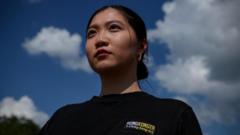In a significant development, Hong Kong police have arrested the father and brother of Anna Kwok, a prominent pro-democracy activist currently residing in the United States. According to reports from local media, the arrests come under the controversial national security law, marking a grim escalation in the Hong Kong government's efforts to silence dissent by targeting activists and their families.
Anna Kwok, now 26, gained notoriety for her participation in the pro-democracy protests of 2019. After fleeing to the U.S. in 2020, she took on the role of Executive Director at the Hong Kong Democracy Council (HKDC) in Washington, D.C. The police allege that Kwok's relatives were involved in handling her financial assets, which raised suspicions leading to their arrest.
The two detained individuals, aged 35 and 68, were later identified as Ms. Kwok's father, Kwok Yin-sang, and brother. Reports indicate that the elder Kwok is accused of attempting to access his daughter's insurance policy, which is seen as a means of obtaining funds for her benefit. Following his arrest, he was denied bail by national security judge Victor So at the West Kowloon Magistrates' Courts. Meanwhile, his son has been granted bail but remains under investigation.
This unprecedented legal action reflects a worrying trend in Hong Kong's ongoing crackdown on pro-democracy figures. Under the stringent Safeguarding National Security Bill, it is deemed illegal to provide any financial support to individuals classified as "absconders." Anna Kwok is one of eight activists targeted by the Hong Kong government, which has pursued bounties for their capture and accused them of various offenses, including colluding with foreign forces.
Speaking out against this latest intimidation tactic, Kwok previously described the government's actions as a method of silencing dissenting voices within and outside Hong Kong. The situation underscores the increasing challenges faced by activists and their families in a city that has seen a significant erosion of freedoms since its return to Chinese sovereignty in 1997.
Anna Kwok, now 26, gained notoriety for her participation in the pro-democracy protests of 2019. After fleeing to the U.S. in 2020, she took on the role of Executive Director at the Hong Kong Democracy Council (HKDC) in Washington, D.C. The police allege that Kwok's relatives were involved in handling her financial assets, which raised suspicions leading to their arrest.
The two detained individuals, aged 35 and 68, were later identified as Ms. Kwok's father, Kwok Yin-sang, and brother. Reports indicate that the elder Kwok is accused of attempting to access his daughter's insurance policy, which is seen as a means of obtaining funds for her benefit. Following his arrest, he was denied bail by national security judge Victor So at the West Kowloon Magistrates' Courts. Meanwhile, his son has been granted bail but remains under investigation.
This unprecedented legal action reflects a worrying trend in Hong Kong's ongoing crackdown on pro-democracy figures. Under the stringent Safeguarding National Security Bill, it is deemed illegal to provide any financial support to individuals classified as "absconders." Anna Kwok is one of eight activists targeted by the Hong Kong government, which has pursued bounties for their capture and accused them of various offenses, including colluding with foreign forces.
Speaking out against this latest intimidation tactic, Kwok previously described the government's actions as a method of silencing dissenting voices within and outside Hong Kong. The situation underscores the increasing challenges faced by activists and their families in a city that has seen a significant erosion of freedoms since its return to Chinese sovereignty in 1997.



















